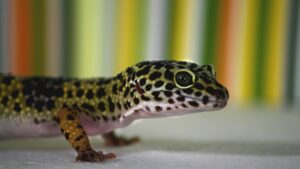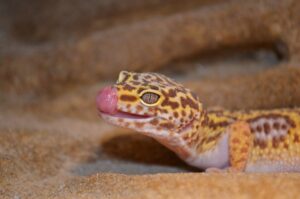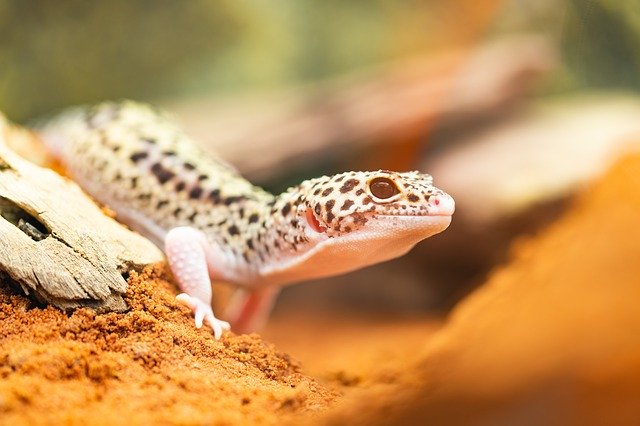Let’s take a look at the leopard gecko diet. Leopard geckos are one of the most popular species of lizards at this time. They are a great beginner lizard to keep as a pet because they are quite hardy little creatures and are fairly easy to look after.
One of the biggest questions that I hear from new or potential owners is:
“What should I feed to my leopard gecko?”
Well in this leopard gecko diet guide I will be telling you everything you need to know about how and what to feed leopard geckos.
What do leopard geckos eat in the wild, leopard gecko diet?
In the wild, leopard geckos have very little option as they are naturally mainly found in desert areas. They aren’t picky eaters because of this, and will generally eat anything small enough to fit into their mouths. They have even been spotted eating small nesting mice.
They eat any insects they can find, and even have the ability to store extra fat in their tails to ensure they are able to still nourish themselves in tough times when they don’t have access to food. Crickets, mealworms and grasshoppers are among some of the main insects they will eat in the wild.
What leopard geckos eat in captivity?
In captivity, they only eat live insects. They shouldn’t be fed any dead or dried up insects, and it’s best to avoid feeding them any fruits and vegetables.
Staple insects to feed your little friend are crickets and mealworms, and on occasion they can be fed insects such as butterworms as they are too high in fat to be fed regularly.
They won’t eat any insects that are bigger than the space between their eyes. They will only eat live prey so the more the insects move the more likely they are to eat it.
What to feed baby leopard geckos?
Baby leopard geckos should be fed crickets that are about three eighths long. They won’t be able to eat insects any bigger than that.
They should be fed a staple leopard gecko diet of crickets andmealworms. On occasion they can eat butterworms or superworms as a treat. It is vital that you only feed them live insects as they will only eat anything that moves or wiggles in front of them.
They shouldn’t eat any fruits or vegetables. They should be fed daily, and around 4-8 insects per feeding. You should primary focus on feeding them insects that are low in fat and higher in protein.
What to feed adult leopard geckos?
Adult leopard geckos eat similarly to their babies, but need to be feed bigger insects. They can eat small or full sized crickets, but as with their babies they won’t eat any insects bigger than the space between their eyes.
They will only eat live insects and they shouldn’t be fed any fruits or vegetables. They will eat every alternative day on average, and will eat around 5-10 insects (or as many as they can eat within 15-20 minutes).
What insects should you feed to leopard geckos?
You can feed your leopard gecko a variety of insects. The staple insects you should focus on are crickets and mealworms. You can include other insects such as butterworms, superworms and waxworms. These worms are higher in fat and should rather be kept as a treat on occasion. You can also include other insects such as cockroaches into the leopard gecko diet.

Take a look at the leopard gecko diet.
How to feed your leopard gecko:
Leopard geckos will sometimes overeat if they are left to eat as much as they want in their enclosures. It is best for you to only feed them as many insects as they can eat within 15-20 minutes. When they are finished eating, remove any remaining insects from their enclosure.
It is easiest to transfer insects from the container using a critter keeper container. This will help you avoid any excess insects escaping their bigger container and other accidents from possibly happening. It will also help you control how much you feed your leopard gecko.
You can gut load the insects you feed your gecko by feeding them supplements to benefit your leopard gecko. These can be purchased at any pet store. You can also lightly dust the insects with calcium powder immediately before feeding them to your leo to avoid the insects from cleaning the dust off of themselves.
How to keep and store insects for your leopard gecko?
You can keep the insects you purchase in sturdy, plastic containers. It is recommended that the plastic container is a coloured container so that if you have guests over who may be afraid of bugs, they won’t get a fright if they see them.
The insects should be stored in a safe area where they won’t be bumped by small children or any other pets you may have. You should also consider things like how much the insects smell or what noise they make so that you can ensure that you aren’t frustrated by them.
It is best to store them away from where they might bother you, and also ensure that the insects are stored in the correct climate for their species. You can easily buy the insects in bulk and keep them in a strong plastic container, and then transfer them in a smaller container called a critter keeper at feeding time. It is also highly recommended that you gut load your insects by feeding them supplements and vitamins for your leo to thrive.
Where to get insects for your leopard gecko.
It is highly recommended that you only feed your leopard gecko insects that are bought from a pet store. They are easy to purchase, affordable and they can be stored effortlessly in a sturdy plastic container. They can also be purchased in bulk to make it even more convenient.
Wild insects could be carrying parasites, or be full of pesticides which can harm your leopard gecko greatly.
Can leopard geckos live off only crickets?
Yes, crickets can very easily be one of leopard geckos staple meals. Crickets have a number of incredible nutrients that leo’s require to thrive, and so if you feed them gut loaded and live crickets they can thrive off of this. They are not too fatty and will be able to survive off of crickets alone. Crickets are also extremely easy to find and are an affordable option. They are also easy to store.
Can leopard geckos eat and live off only mealworms?
Mealworms are another great staple food to feed them regularly. They are used to great variety in the wild, and mealworms are not too fatty for them. They also have great nutrients leopard geckos need to thrive off of. As always, remember that the mealworms you feed your leo should be smaller than the space between their eyes. Mealworms are easy to find in any pet store and can be stored conveniently in a sturdy plastic container.
Can leopard geckos eat and live off only butterworms?
No, butterworms should be kept as a treat and not as a staple meal. It is too fatty for your leopard gecko and can cause them to become severely overweight if they eat it too regularly. They will really enjoy eating butterworms. They are also high in calcium which makes them great to add into your leopard geckos diet on occasion. They may be a little bit harder to find, and have slow movements so your leopard gecko may be less likely to eat it. Leopard geckos will be obese if they are fed butterworms primarily.
Can leopard geckos eat and live off only scorpions?
In the wild leopard geckos are known to regularly eat scorpions. They are a good food source as they are easy to find and low in fat. They can eat them more regularly, especially since it’s a natural food source for them. You can find scorpions in any pet store and feed them to your leo.
Can leopard geckos eat and live off only silkworms?
Silkworms are one of the best options to make a staple food for your leo! They are however more difficult to find and slightly more expensive. You also can’t buy them in bulk as they don’t live as long as other insects. Silkworms have a large nutritional content to keep your little friends happy. Your leo will also enjoy eating them which is a big plus so it will be well worth the extra expense.
Can leopard geckos eat and live off only waxworms?
Your little leo will absolutely love waxworms because they are full of juicy fat. Like humans however, its best they don’t eat too much fat in the leopard gecko diet as they can cause them to become obese. They are great to use if your gecko hasn’t been eating or has been ill, and will help jumpstart their appetite again. They are also easier to find and a cheaper alternative. Waxworms should be best to be kept as a monthly treat, if even that often.
Can leopard geckos eat and live off only dubai roaches?
Dubai roaches are quickly becoming a more popular meal to feed your little friend. Their movement helps encourage your leo to eat, and they are easy to gutload. They are smaller so your leo will more than likely eat it without having any issues. They are also more convenient to store within your home because they don’t smell as much.
They are high in protein and low in fat which makes them the perfect staple for your leopard gecko. Unfortunately they may be a little harder to find and are slightly more expensive, but if you are able to source them they are easy to breed. They can quite easily live off of only dubai roaches.

Take a look at the leopard gecko diet.
Can leopard geckos eat and live off only phoenix worms?
Phoenix worms are great to add variety into your little leopard gecko diet but they aren’t the best option to make it their staple meal. They are lower in fat, and have a moderate amount of protein but not as much as silkworms and crickets which is why phoenix worms aren’t as ideal for a staple food.
They are however easy to find and cheaper, and they contain the best calcium to phosphorus ratio. They can be regularly included into your leopard gecko diet without any issue. They also help stimulate feeding because of their movements.
Can leopard geckos eat and live off only locusts?
Although locusts can be a bit too big for your leopard gecko to eat, they are a great source of protein and can be regularly fed to your leo. They may be a little bit more difficult to find, but their movements also help stimulate feedings for your gecko.
They are also quite easy to gut load and are a great option if you can find locusts small enough to feed your leopard gecko – remember they need to be smaller than the space between your leo’s eyes in order for them be able to eat the locusts.
Can leopard geckos eat and live off only superworms?
These are also called king worms, and are a fantastic treat to feed your little friend. These worms are higher in fat and lower in protein, so while your leopard gecko will love eating them – although they aren’t as healthy for your leopard geckos and will cause them to become obese if they are fed too regularly.
They can also bite your gecko, and might be too big for smaller geckos to eat. They also don’t gut load as well as other insects, but they are cheaper and as mentioned – your leopard gecko will enjoy eating them.
Can leopard geckos eat and live off only hornworms?
Hornworms are easier for your leopard gecko to digest as they don’t have much of an exoskeleton. They are also more filling, but have a lower protein content than other insects which make then less than ideal for a staple meal. They are lower in fat, so it is safe to feed them to your leopard gecko more regularly.
They are however more expensive and can be difficult to find so it is not a recommended source of protein when there are better options available. They can be added into your leopard geckos diet for variety.
Can leopard geckos eat and live off only flies?
Flies are a great insect to include in your leopard geckos diet. Fruit flies are normally the easiest to find, and they can eat it regularly. They aren’t as suitable as other insects such as silkworms, or crickets but they can be included for variety. They are slightly harder to store too, but are affordable. They also simulate feeding as they move a lot and your leo is attracted to prey that moves more.
Can leopard geckos eat and live off only caterpillars?
In the wild leopard geckos do eat caterpillars, but there is not enough evidence that they can eat them primarily and get all the nutrients they need. They can be added into your leopard gecko diet for variety.
The insects you need to avoid feeding your leopard gecko.
Fattier insects should only be kept as a treat, and you should total avoid insects which glow. The chemicals within these insects which make them glow are extremely toxic to leopard geckos and can harm your leopard gecko. In fact its so toxic, vets haven’t been able to find a solution to save leopard geckos as they often don’t even make it to the vets in time. A single glowing bug is enough to kill your little friend, so you should ensure that they don’t have any access to these kinds of bugs.
You should also never feed your leopard gecko any bugs you have caught or found in your garden/house. Wild insects could contain parasites or have pesticides on them which could also harm your little friend or even be lethal to them. It is highly recommended that you only feed them store bought insects or insects you have bred yourself.
Can leopard geckos eat fruits and vegetables?
No they shouldn’t be fed any fruits or vegetables. They get all the nutrients they need from insects such as crickets, flies, silkworms and mealworms.
What about supplements?
As with humans, it is best for you to include supplements into your leopard geckos diet. Thankfully this is quite easy to do, and you can find such supplements at any pet store and most vets.
You should lightly dust your insects with calcium supplements before feeding them to your leopard gecko about twice a week, and you can also ensure that get all the protein they need by gut loading the insects by feeding them vitamin D supplements. Some insects aren’t able to do this such as superworms, but crickets are able to gut load quite well.
In conclusion:
You should always feed your leopard live insects because they won’t even be interested in dead prey. They sometimes won’t even eat prey that moves too slowly and it is best to get prey that moves and wriggles a lot to peak their interest.
Crickets, mealworms and silkworms are ideal staple meals to feed your leopard gecko. Adult leopard geckos on average only need to eat about 5-10 insects (or as many as they can eat within 15-20 minutes) every alternative day.
Baby leopard geckos need to eat about 4-8 insects every day and sick or weak leopard geckos should also be fed every day until they are better again. If your leo is a picky eater you can leave some insects in their enclosure for when they get hungry.
They do not need to eat any fruits, or vegetables. You should also focus on feeding them insects that are higher in protein as fatty insects such as superworms can cause them to become obese and unhealthy.
You can store the insects you purchase for them in a sturdy, plastic container in a safe and convenient place. They should be kept away from children and your other pet who might bump the container and allow the insects to escape.
You should feed them gut loaded insects and insects dusted with calcium in order to ensure they received a balanced leopard gecko diet and all of the nutrients they require. Its best to feed them at night as they are nocturnal. You should remove any uneaten insects from their cage.
Leopard geckos are easy to care for and are fun to feed. They can eat a variety of insects and you should change up their diet regularly to ensure they get all the nutrients they require.
If this guide has been some help why not check out some of the many other leopard gecko guides that are on this website.
